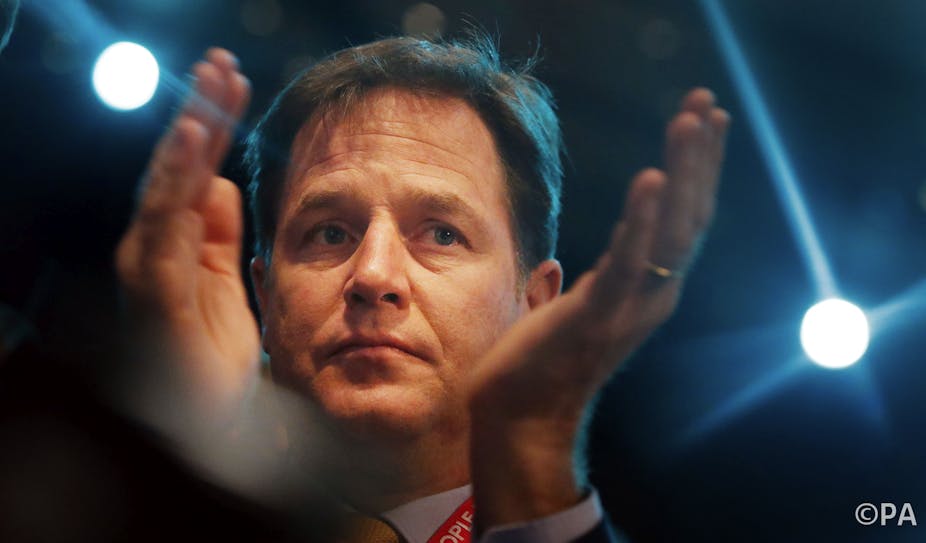The UK’s smaller political parties have been showered with attention of late. We’ve seen Green Party leader Natalie Bennett interviewed on the BBC’s Andrew Marr Show – one of the most coveted media platforms for election hopefuls, and UKIP leader Nigel Farage continues to provide good copy and good telly to most news organisations, setting the political agenda along the way.
Meanwhile, the Scottish National Party and the Democratic Unionist Party are taken seriously by journalists as potential members of a future coalition government.
As this belated but welcome media celebration of multi-party politics goes on, one group in parliament is starting to realise that it is no longer the special guest at the party. The Liberal Democrats may be the worst hit by the explosion of multi-party politics.
And as ironic as this turn of events might be, it was perhaps unavoidable. The party has long been paying the price for having joined a coalition government with the Conservatives and now the 2015 general election is taking place in a very crowded electoral field. It is both insider and outsider – and a loser on both fronts.
Looking for a coalition?
In the run-up to the May 7 election, Nick Clegg is trying to position the Liberal Democrats as the natural party of coalitions. He and his front bench team are doing all they can to demonstrate that the UK is a fairer, more prosperous country as a result of their participation in the coalition government.
But it is not clear if this strategy will pay off electorally. There is no denying that the Liberal Democrats managed to restrain the Conservatives on a number of policies. The problem is that this restraining role is invisible to most voters.
And after almost five years in government, the Liberal Democrats have very little to show in terms of their achievements. Apart from a few successes with some small policies – such as bringing in the pupil premium and increasing personal tax allowances to £10,500 – the party has little to boast about and quite a lot to hide.
It was not just the u-turn on tuition fees that made the Liberal Democrats unpopular. There were dozens of other small betrayals. The bedroom tax, the approach to the public deficit, nuclear energy are just some of the problems that caused thousands of supporters to desert the party.
Since 2010 the party has lost all but one of its 11 MEPs, roughly 40% of its councillors and, if the current trend in voting intentions is confirmed on May 7, between a half or a third of its MPs.
A recent opinion poll also revealed that voters do not trust Nick Clegg. Asked if they would expect to get back a £10 note lent to a party leader, just 44% said the Liberal Democrat leader would return it. The prime minister David Cameron had a slightly better result, with only 49% saying they would expect him to pay back his loan.
Fighting for the spotlight
To combat this doomsday scenario, the Liberal Democrats have been investing in an all-fronts electoral campaign. They will rely on pavement politics and will take advantage of the free publicity that the media coverage will provide – handy, considering how empty the party coffers are.
This is a tried-and-tested formula that has worked wonders for the party in the past but the odds are stacked against it this time. The competition for media attention will be fierce and the party does not benefit from the novelty factor like the Greens or UKIP. To a certain extent, joining the Conservatives in a coalition government transformed the Liberal Democrats into an establishment party.
However, as the country’s third party they will not enjoy the same media attention as Labour and the Conservatives. Nor are they winning the fight for attention with the small parties that enjoy the full privilege of being in opposition.
The problem is that the narrative of the 2015 election is about the explosion of multiparty politics and the uncertainty it brings. This means that the media will be paying far more attention to both Labour and the Conservatives, and then to the parties that seem to be breaking the mould of British politics. In this scenario, the Liberal Democrats will struggle to not to be squeezed out from a very crowded and competitive electoral field.

